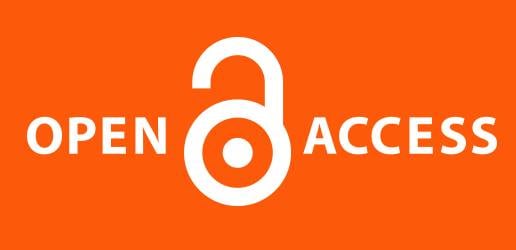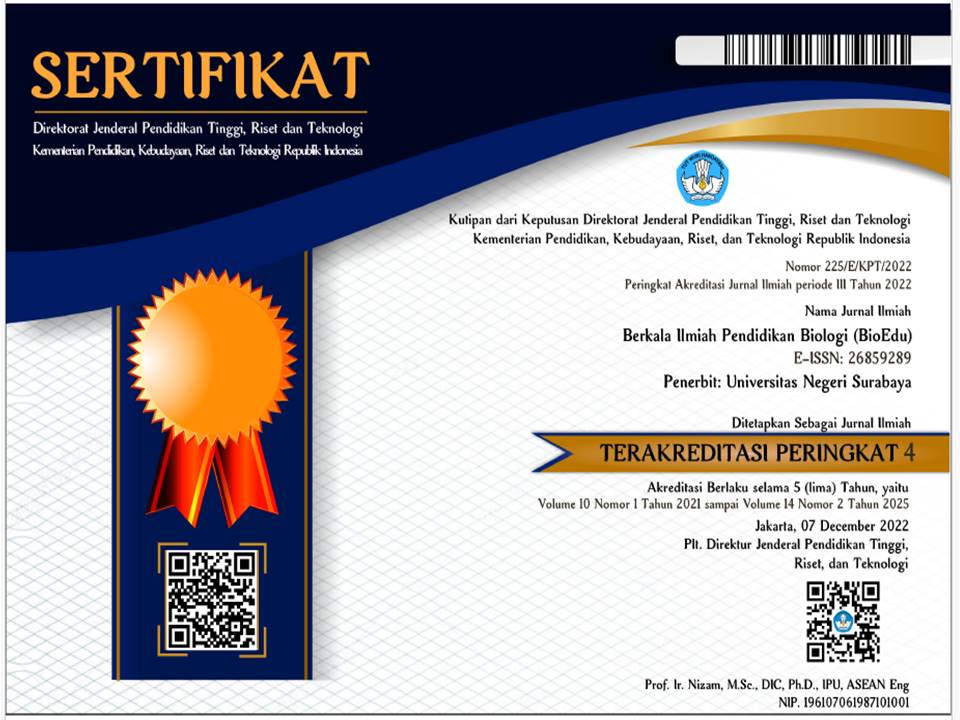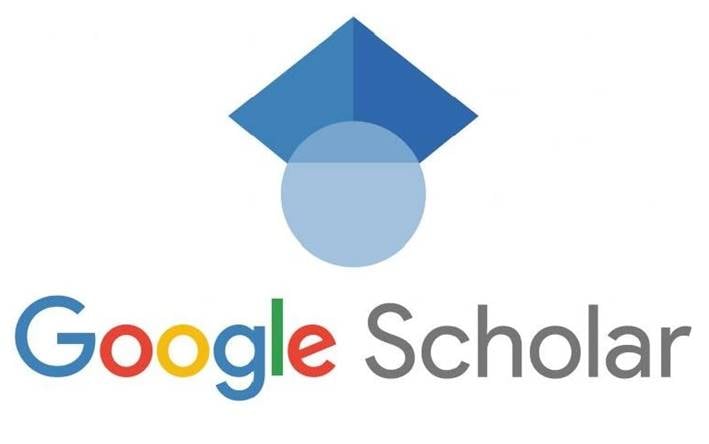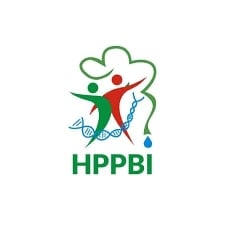Pengaruh Penggunaan Virtual Laboratory terhadap Kemampuan Literasi Saintifik Sisiwa pada Materi Evolusi
DOI:
https://doi.org/10.26740/bioedu.v13n2.p458-464Abstract
Abstrak
Penggunaan virtual laboratory dalam pembelajaran bertujuan untuk menaikkan kualitas pendidikan Indonesia, khususnya dalam mengatasi tingkat kemampuan literasi saintifik yang dinilai masih lemah. Virtual laboratory menyediakan simulasi interaktif yang memungkinkan siswa untuk mengamati dan berpartisipasi secara langsung dalam eksperimen, memperkuat pemahaman konsep saintifik. Dibidang biologi terutama materi evolusi, penting untuk dapat membedakan antara fakta ilmiah yang didukung oleh bukti dan opini yang mungkin tidak memiliki dasar ilmiah. Tujuan penelitian untuk menganalisis pengaruh penggunaan virtual laboratory terhadap kemampuan saintifik siswa dalam materi evolusi. Di kelas XI F2, siswa berada dalam kelompok eksperimen, dan di kelas XI F12, siswa berada dalam kelompok kontrol. Metode yang digunakan yaitu uji hipotesis untuk menganalisis data. Sebelumya dilakukan, uji normalitas Shapiro Wilk dan uji homogenitas (Levene test) berbantuan SPSS. Hasil penelitian menyatakan nilai t hitung 4,810 dengan sig 0,000 dan nilai t tabel 2,101 dari df 18, pada taraf signifikansi 0,05. Nilai t hitung > t tabel, dengan 4,810 > 2,101, dan nilai sig < 0,05, dengan p 0,000 < 0,05. Demikian, hipotesis nol (H0) ditolak, sementara hipotesis alternatif (H1) diterima. Nilai N-Gain kelas eksperimen sebesar 0,53 termasuk kategori tinggi dan kelas kontrol mempunyai nilai N-Gain sebesar 0,05 termasuk kedalam kategori rendah. Hasili menunjukkan bahwasanya penggunaan virtual laboratory dalam pembelajaran efektif digunakan untuk meningkatkan kemampuan literasi saintifik siswa. Maka disimpulkan bahwasanya siswa menggunakan lab virtual memiliki kemampuan literasi saintifik yang lebih baik. Secara keseluruhan diketahui bahwa menggunakan lab virtual memberi dampak yang positif terhadap kemampuan literasi saintifik siswa.
Kata Kunci: virtual laboratory, literasi saintifik, pengaruh, evolusi.
Abstract
The utilization of a virtual laboratory in education aims to enhance the standard of education in Indonesia, especially in addressing the level of scientific literacy, which is still considered weak. The virtual laboratory provides interactive simulations that allow students to observe and participate directly in experiments, strengthening their understanding of scientific concepts. In the realm of biology, particularly in the of evolution, it is crucial to differentiate between scientific facts supported by evidence and opinions that may lack a scientific basis. The aim of this study is to examine the effects of employing a virtual laboratory on students' proficiency in scientific literacy regarding the subject of evolution. In class XI F2, students were in the experimental group, and in class XI F12, The students were part of the control group. The method used was hypothesis testing to analyze the data. Prior to this, Using SPSS, the Levene's test for homogeneity and the Shapiro-Wilk normalcy test were performed. T-values from df 18 and t-table values from df 18 at a significance level of 0.05 and 0.000, respectively, were displayed in the results. P was 0.000 less than 0.05, indicating that the significance value was less than 0.05 and the t-value was more than the t-table value, with 4.810 being greater than 2.101. This means that although the alternative hypothesis (H1) was adopted, the null hypothesis (H0) was rejected. Classified as low, the control group's N-Gain value was 0.05, whereas the experimental class's value was 0.53, indicating a high level of performance. The findings suggest that utilizing a virtual laboratory in education is efficient in enhancing students' scientific literacy abilities. In conclusion, that students using the virtual lab have better scientific literacy skills. From the research conducted, it is overall known that using the virtual lab positively influences students' scientific literacy abilities.
Keywords: virtual laboratory, scientific literacy, influence, evolution.
Downloads
 Abstract views: 438
,
Abstract views: 438
, PDF Downloads: 346
PDF Downloads: 346













